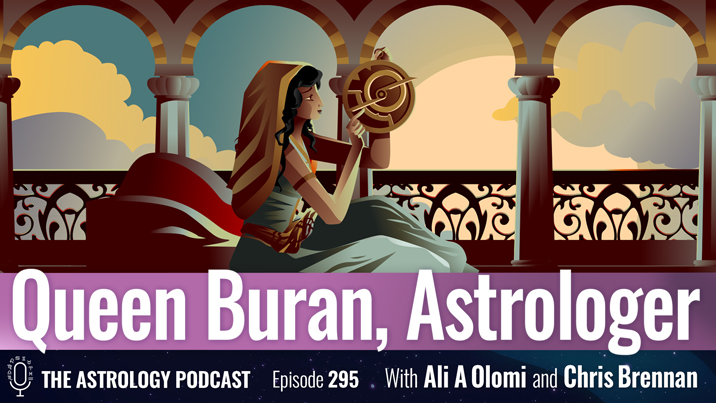
Episode 295 features an interview with Ali A Olomi about the 9th century Queen Buran, who is the first woman we know of by name that practiced astrology.
Previously in episode 86 I discussed historical references to women practicing astrology as early as the 1st century CE, and discussed the 5th century philosopher Hypatia as one possible candidate for earliest figure.
In this episode we focus on the famous Queen Buran, who lived in Baghdad in the 9th century, and talk about how she is a much more reliable candidate for earliest woman in history who likely had training as an astrologer and used it in practice.
Buran was the wife of the Caliph Al-Ma’mun, who reigned from 813–833, during the early Islamic Golden Age. Their wedding was so extravagant that it became known as something of a legend for centuries.
Buran came from a notable family line of astrologers, and her great-grandfather Nawbakht al-Farisi was the head of a group of astrologers that selected the electional chart for the founding Baghdad.
A legend survives about a prediction that Buran herself made using astrology that helped to avert an assassination attempt on the Caliph al-Mu’tasim.
We spent a good deal of the episode contextualizing Buran’s life in 9th century Baghdad, discussing the history of the Persian and Arabic astrological traditions in the early medieval period, and talking about some of the notable astrologers that were contemporaries of Buran such as Masha’allah, Sahl ibn Bishr, and Abu Ma’shar.
Ali is a historian of the Middle East and Islam, who focuses in particular on esotericism, astrology, and folklore. He is also the host of the Head on History Podcast, and posts weekly threads on astrology and esotericism through his page on Twitter @aaolomi.
This episode is available in both audio and video versions below.
Episode Outline and Show Notes
You can download the episode outline here:
This is a version of the show notes that Chris prepared prior to the interview.
Bibliography
Bibliography of some works cited:
Kenneth Johnson, “Buran of Baghdad: An Astrological Woman in the Early Middle Ages,” in the National Council for Geocosmic Research (NCGR) Geocosmic Journal, ed. Leigh Westin and Demetra George, Autumn 2006, pp. 29–33.
George Saliba, “The Role of the Astrologer in Medieval Islamic Society,” Bulletin D’études Orientales, vol. 44, 1992, pp. 45–67.
Ibn al-Sāʿī, Consorts of the Caliphs: Women and the Court of Baghdad, ed. Shawkat M. Toorawa, NYU Press, 2015.
Timestamps
Here are some timestamps for topics covered at different points in the episode:
00:00:00 Intro
00:01:12 Ali and his work
00:07:57 Early women in astrology
00:12:12 Transmitting knowledge through family lineages
00:17:49 Buran’s name
00:20:07 Conflicting reports about her birth year
00:22:40 Possible chart for Buran
00:24:05 Whole sign houses used in Arabic horoscopes
00:35:00 Birth Chart of Ali ibn Abi Talib 14th Century
00:43:07 12th century solar return chart
00:45:02 Buran’s background in the 9th century
00:46:20 Baghdad as cultural center
00:49:50 Electional chart of Baghdad
00:57:49 Electional astrology in Baghdad
01:03:00 Mars in the Baghdad chart
01:09:00 Baghdad city design
01:11:38 Translations of astrology texts
01:15:48 Alexandria
01:19:26 Ethnicity and ancient sources
01:22:09 House of Wisdom in Baghdad
01:28:53 Buran’s family line
01:34:00 Persian tradition of astrology
01:40:57 Nawbakht the Persian (c. 679-777)
01:44:51 Buran’s training in astrology
01:48:50 Buran’s husband Al-Ma’mun
01:56:29 Buran and Al-Ma’mum’s lavish wedding
02:01:10 Connection to astrologer Sahl ibn Bishr
02:04:50 Sahl’s influence as an astrologer
02:08:02 Sahl works for Buran’s father
02:14:50 Importance of Dorotheus
02:17:29 Al-Ma’mum’s death
02:19:00 Buran’s poem to mourn her husband
02:20:48 Buran’s life after his death
02:24:38 The legend of Buran’s astrological prediction
02:27:33 Other women astrologers
02:30:25 Social stratification of the astrologers
02:33:20 Al-Qabisi’s test of astrologers
02:36:25 Astrolabe technology
02:40:20 Buran’s advanced techniques
02:52:20 Buran’s later life and legends
03:02:25 Ali’s podcast, Patreon, and Twitter
03:08:33 Shout-out to artist Matias Del Carmine
03:09:00 Closing remarks
Watch the Video Version of This Episode
Watch the video version of this episode on Buran through YouTube:
–
Transcript
A full transcript of this episode is available: Episode 295 transcript
Listen to the Audio Version of This Episode
You can either play the audio version of this episode of the podcast directly from the website or download it as an MP3 to your device by using the buttons below:
Podcast: Play in new window | Download (Duration: 3:10:35 — 174.8MB)
